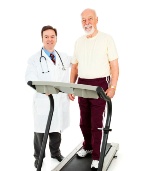 What is an exercise stress test and who needs one? An exercise stress test is meant to check the function of your heart. If you’ve been complaining of chest pain or if engaging in some normal physical activity causes you to feel winded, you may be a candidate for this test. An exercise stress test may also be ordered by your doctor if you’re feeling fatigued but can find no obvious explanation why you should feel so tired.
What is an exercise stress test and who needs one? An exercise stress test is meant to check the function of your heart. If you’ve been complaining of chest pain or if engaging in some normal physical activity causes you to feel winded, you may be a candidate for this test. An exercise stress test may also be ordered by your doctor if you’re feeling fatigued but can find no obvious explanation why you should feel so tired.
A typical exercise stress test works like this: you’ll be asked to walk on a treadmill. The treadmill exercise program is designed to slowly and steadily make you work harder. You’ve likely tried this type of work-out at the gym, where the exercise machine creates resistance to simulate going up a hill or gaining speed over a flat stretch. While you perform the exercise program, an electrocardiogram monitors your heart’s performance. The ECG can reveal any changes in your heart’s electrical rhythms.
Your doctor also performs some tests while you’re exercising too. He or she will be looking for changes in your blood pressure, and whether you feel any chest pains or sudden fatigue. Any abnormalities that show up could mean your heart is struggling. This could be due to plaques clogging your arteries and reducing the flow of blood to your heart. Or, in other words, you may have developed coronary artery disease.
The exercise stress test sounds like a reasonable and protective measure to take, so why doesn’t everyone get signed up for one? We have regular check-ups at the dentist and the eye doctor—why not get a stress test on the heart too, just to see how it’s coping? After all, it’s non-invasive and doesn’t really cause any medical discomfort.
However, the U.S. Preventive Services Task Force—responsible for making recommendations to doctors—has told doctors not to perform the exercise stress test as a matter of routine. They have urged doctors to administer the test only when a patient shows symptoms of coronary artery disease or has a number of risk factors for getting the condition. The American College of Cardiology also supports this recommendation by the Preventive Services Task Force.
So what’s the issue here? Why are these high profile organizations taking this stance? It turns out that the exercise stress test—like many medical tests—isn’t 100% accurate. In the same way that breast cancer screenings can miss some tumors and misdiagnose “phantom” tumors in others, the exercise stress test isn’t able to accurately diagnose all cases of coronary artery disease. Results of the test can also point to coronary artery disease when in fact, the disease isn’t present. The test is not a diagnostic tool. For this reason, the Preventive Services Task Force has recommended not using the test just to check-up on the heart.
No one wants to miss getting a diagnosis of a serious condition. On the other hand, having a test that leads to other procedures and more follow-up tests can be both frustrating and stressful, never mind the added expense and time.
For now, the exercise stress test is only recommended for those who are showing signs of heart disease. The decision to have an exercise stress test rests with your doctor and his or her judgment of your heart function, and your health profile and history.
Source(s) for Today’s Article:
“What exercise stress testing can tell you about the heart and what it can’t, from the April 2013 Harvard Men’s Health Watch,” Harvard Men’s Health Watch website, April 2013; www.health.harvard.edu, last accessed July 1, 2013.
“Exercise Stress Test,” The American Heart Association website, April 15, 2013; www.heart.org, last accessed online July 1, 2013.
